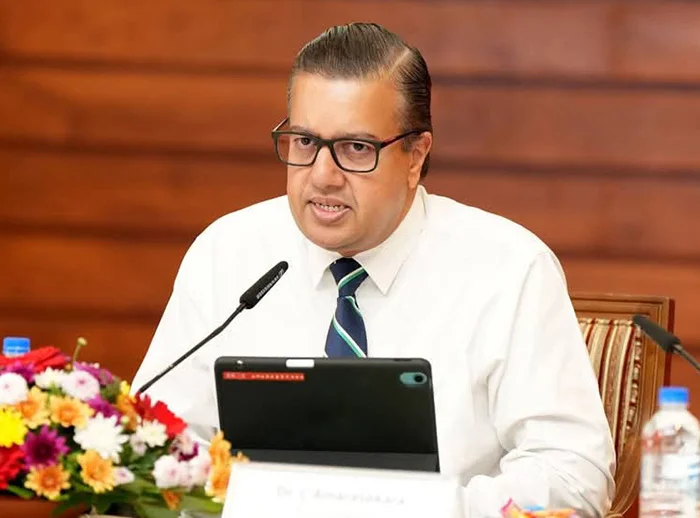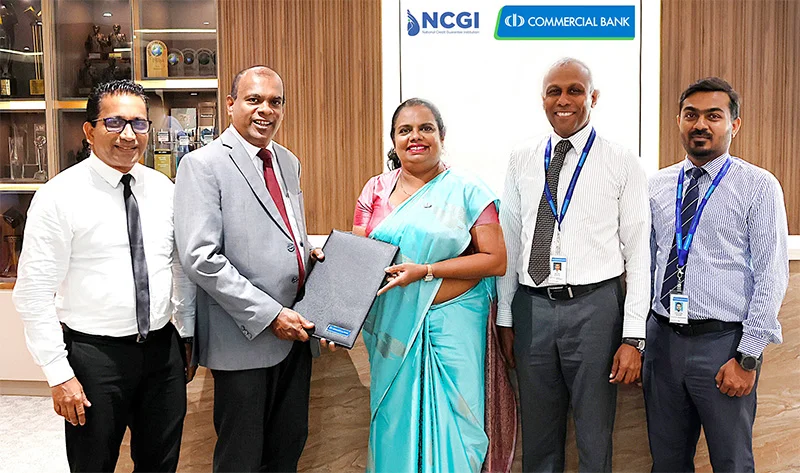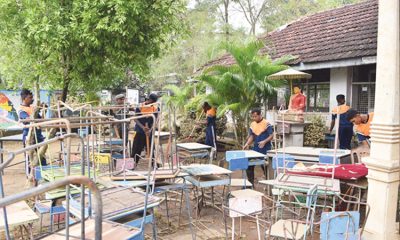Business
CBSL reaffirms commitment to economic recovery

By Ifham Nizam
The Central Bank of Sri Lanka (CBSL) has reaffirmed its commitment to stabilizing inflation and supporting economic recovery through a carefully calibrated monetary policy stance. The February 2025 Monetary Policy Report (MPR) outlines key trends in inflation, interest rates and economic growth, offering insights into the nation’s financial future.
To enhance awareness on the report, the Bank hosted two discussions chaired by Assistant Governor Dr. Chandranath Amarasekere, with expert insights from the Director of the Economic Research Department, Directors of the Monetary Policy Committee and technical teams of the Economic Research Department.
The CBSL maintained its accommodative monetary policy throughout 2024, with a notable rate cut in November when it introduced a single policy rate mechanism—the Overnight Policy Rate (OPR)—set at 8.00%. This move effectively reduced interest rates by 50 basis points, a decision aimed at spurring economic activity while keeping inflation in check.
The monetary easing strategy aligns with the CBSL’s broader objective of anchoring inflation expectations, enhancing transparency and fostering financial market stability. As of January 2025, the OPR remains at 8.00%, signaling the bank’s confidence in its current approach.
Sri Lanka experienced deflation in the second half of 2024, driven largely by reduced electricity tariffs, lower fuel prices, and declining food costs. Since September 2024, headline inflation has remained in negative territory, reflecting a sharp drop in consumer price levels.
Looking ahead, the CBSL projects inflation to stabilize around 5% over the medium term. However, short-term risks remain. Inflation may temporarily exceed the target between late 2025 and mid-2026 before normalizing.
The report highlights several key risks to inflation:
Upside risks: Rising global food and energy prices, potential currency depreciation and unpredictable fiscal policies could push inflation higher.
Downside risks: Further price reductions in essential goods and energy could extend the deflationary trend.
The Sri Lankan economy is on a recovery path, albeit at a moderate pace. The CBSL acknowledges that the economy is operating below full capacity, with growth dependent on policy measures and external factors.
Key risks to growth include:
Labour shortages due to brain drain
Uncertain global economic conditions
Impact of climate change on agriculture
Conversely, debt restructuring and tourism recovery could provide much-needed economic momentum.
Despite statistical evidence of falling prices, many Sri Lankans do not feel a significant improvement in their cost of living. The report suggests this disconnect stems from:
Past inflation episodes, which have left prices elevated despite recent declines.
Income levels lagging behind inflation trends, reducing purchasing power.
Psychological and behavioral factors, where consumers may not perceive small price reductions as meaningful relief.
The CBSL’s focus remains on managing inflation expectations, ensuring financial stability, and supporting economic growth. While the current outlook suggests a gradual recovery, external shocks and domestic challenges could still pose risks.
As Sri Lanka navigates its economic future, policy consistency, fiscal discipline, and structural reforms will be critical in achieving long-term stability.
With inflation stabilizing and monetary policy remaining accommodative, the CBSL appears confident in its strategy. However, whether these measures translate into real economic relief for the public remains to be seen.
Business
Sampath Bank’s strong results boost investor confidence

The latest earnings report for Sampath Bank PLC (SAMP), analysed by First Capital Research (FCR), firmly supports a positive outlook among investors. The research firm has stuck with its “MAINTAIN BUY” recommendation , setting optimistic targets: a Fair Value of LKR 165.00 for 2025 and LKR 175.00 for 2026. This signals strong belief that the bank is managing the economy’s recovery successfully.
The key reason for this optimism is the bank’s shift towards aggressive, yet smart, growth. Even as interest rates dropped across the market, which usually makes loan income (Net Interest Income) harder to earn, Sampath Bank saw its total loans jump by a huge 30.2% compared to last year. This means the bank lent out a lot more money, increasing its loan book to LKR 1.1 Trillion. This strong lending, which covers trade finance, leasing, and regular term loans, shows the bank is actively helping businesses and people spend and invest as the economy recovers.
In addition to loans, the bank has found a major new source of income from fees and commissions, which surged by 42.6% year-over-year. This money comes from services like card usage, trade activities, and digital banking transactions. This shift makes the bank less reliant on just interest rates, giving it a more stable and higher-profit way to earn money.
Importantly, this growth hasn’t weakened the bank’s foundations. Sampath Bank is managing its funding costs better, partly by improving its low-cost current and savings account (CASA) ratio to 34.5%. Moreover, the quality of its loans is getting better, with bad loans (Stage 3) dropping to 3.77% and the money set aside to cover potential losses rising to a careful 60.25%.
Even with the new, higher capital requirements for systemically important banks, the bank remains very strong, keeping its capital and cash buffers robust and well above the minimum standards.
In short, while the estimated profit for 2025 was adjusted slightly, the bank’s excellent performance and strong strategy overshadow this minor change. Sampath Bank is viewed as a sound stock with high growth potential , offering investors attractive total returns over the next two years.
By Sanath Nanayakkare
Business
ADB approves $200 million to improve water and food security in North Central Sri Lanka

The Asian Development Bank (ADB) has approved a $200 million loan to support the ongoing Mahaweli Development Program, Sri Lanka’s largest multiuse water resources development initiative.
The program aims to transfer excess water from the Mahaweli River to the drier northern and northwestern parts of Sri Lanka. The Mahaweli Water Security Investment Program Stage 2 Project will directly benefit more than 35,600 farming households in the North Central Province by strengthening agriculture sector resilience and enhancing food security.
ADB leads the joint cofinancing effort for the project, which is expected to mobilize $60 million from the OPEC Fund for International Development and $42 million from the International Fund for Agricultural Development, in addition to the ADB financing.
“While Sri Lanka has reduced food insecurity, it remains a development challenge for the country,” said ADB Country Director for Sri Lanka Takafumi Kadono. “Higher agricultural productivity and crop diversification are necessary to achieve food security, and adequate water resources and disaster-resilient irrigation systems are key.”
The project will complete the government’s North Central Province Canal (NCPC) irrigation infrastructure, which is expected to irrigate about 14,912 hectares (ha) of paddy fields and provide reliable irrigated water for commercial agriculture development (CAD). It will help complete the construction of tunnels and open and covered canals. The project will also establish a supervisory control and data acquisition system to improve NCPC operations. Once completed, the NCPC will connect the Moragahakanda Reservoir to the reservoirs of Huruluwewa, Manankattiya, Eruwewa, and Mahakanadarawa.
Sri Lanka was hit by Cyclone Ditwah in late November, resulting in the country’s worst flood in two decades and the deadliest natural hazard since the 2004 tsunami. The disaster damaged over 160,000 ha of paddy fields along with nearly 96,000 ha of other crops and 13,500 ha of vegetables.
Business
ComBank to further empower women-led enterprises with NCGIL

The Commercial Bank of Ceylon has reaffirmed its long-standing commitment to advancing women’s empowerment and financial inclusion, by partnering with the National Credit Guarantee Institution Limited (NCGIL) as a Participating Shareholder Institution (PSI) in the newly introduced ‘Liya Shakthi’ credit guarantee scheme, designed to support women-led enterprises across Sri Lanka.
The operational launch of the scheme was marked by the handover of the first loan registration at Commercial Bank’s Head Office recently, symbolising a key step in broadening access to finance for women entrepreneurs.
Representing Commercial Bank at the event were Mithila Shyamini, Assistant General Manager – Personal Banking, Malika De Silva, Senior Manager – Development Credit Department, and Chathura Dilshan, Executive Officer of the Department. The National Credit Guarantee Institution was represented by Jude Fernando, Chief Executive Officer, and Eranjana Chandradasa, Manager-Guarantee Administration.
‘Liya Shakthi’ is a credit guarantee product introduced by the NCGIL to facilitate greater access to financing for women-led Micro, Small, and Medium Enterprises (MSMEs) that possess viable business models and sound repayment capacity but lack adequate collateral to secure traditional bank loans.
-

 Features6 days ago
Features6 days agoFinally, Mahinda Yapa sets the record straight
-

 News7 days ago
News7 days agoCyclone Ditwah leaves Sri Lanka’s biodiversity in ruins: Top scientist warns of unseen ecological disaster
-

 Features6 days ago
Features6 days agoHandunnetti and Colonial Shackles of English in Sri Lanka
-

 Business4 days ago
Business4 days agoCabinet approves establishment of two 50 MW wind power stations in Mullikulum, Mannar region
-

 News5 days ago
News5 days agoGota ordered to give court evidence of life threats
-

 Features7 days ago
Features7 days agoAn awakening: Revisiting education policy after Cyclone Ditwah
-

 Features5 days ago
Features5 days agoCliff and Hank recreate golden era of ‘The Young Ones’
-

 Opinion6 days ago
Opinion6 days agoA national post-cyclone reflection period?













